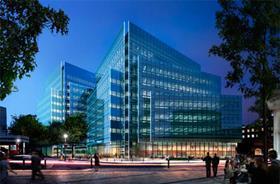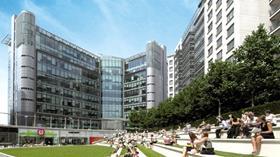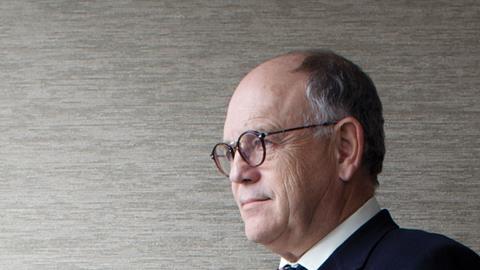Development Securities is venturing away from its core business of commercial as hard times call for diversification, its development director Julian Barwick tells Emily Wright - en route to lunch
Julian Barwick is a man of two eras. On the one hand, he is the epitome of a traditional property player of the boom-time eighties - almost to the point of a stereotype - as he talks about his plans for “an extremely expensive” lunch after this interview and recalls abandoning a brief hippie lifestyle in Morocco aged 19 as he yearned to return to “become a member of the British middle classes.” But when it comes to the future of the commercial property market and Development Securities’ £2bn pipeline, Barwick is as forward thinking as they come.
The firm’s development director has no qualms discussing the fact that, while commercial property might have been Dev Secs’ core business for many years, the time has come to diversify - no matter how hard a message this is to communicate to shareholders. “In a market that has been going sideways at best, trying to build a profitable pipeline exclusively around commercial development, which has historically been our stock and trade, is something we have decided not to pursue at the moment.”
The firm’s results for the 14-month period to March this year highlight just how important a change in strategy will be in such challenging market conditions. On 1 May the firm reported a £10.2m tax loss and a £19.9m decline in assets to £313.2m. But Barwick insists that the future success of the firm rests on the right investment rather than year on year growth. He points to the fact that Dev Secs has completed almost 50 transactions in the last 14 months, compared with just five for the previous period. There is little doubt that the firm’s profile has been raised considerably in the last year - a result of a more active presence across the wider real estate sector from residential and hotel development to land management, says Barwick. But will it be enough?
Here, Barwick explains why he thinks it is, what impact the shift in strategy is likely to have on the group’s current supply chain and how his passion for property robbed him of “a very nice life in the Cotswolds”.

Cooling on commercial
Over the past two years, Development Securities has raised £200m from shareholders but the majority of this equity has deliberately not been invested in commercial property. Instead it has been injected in standing stock that has problems - mostly in suburban London. “We have been putting the money into secondary assets,” explains Barwick. “Some of these will be secondary assets that can then be turned into prime property and some that will make very good secondary.
“The second thing we have been doing is solving planning problems by buying up pieces of land that have a use, though not necessarily the best one, and seeing what prospects there are for changing this use to something more suitable.”
Barwick highlights a number of examples of where this approach to schemes is already working well, including the £20.6m Westminster Palace Gardens scheme in Victoria. “Our work at the moment is, as you can see, mostly residential which is not what people would naturally associate us. But it’s a strategic move to combat the market and, as a company, we will turn our hands to any market where we see an appetite from the end users.”
Barwick is refreshingly honest about the likelihood of Development Securities continuing as a multi-sector developer in the long term, questioning how realistic that would be. In any case, he concedes the change in approach needs careful marketing - especially when presented to shareholders.
Changing supply chain
For now, though, and for the immediate future, the group’s supply chain is looking more varied than it has in the past. And for this, new skills within the supply chain are required. And what Barwick wants isn’t necessarily what people might expect.
“Our supply chain is certainly getting bigger and every project starts from first principles so there are definitely opportunities for new firms to get involved. Moving into new sectors, we need new expertise. But the competition is fierce. As the fortunes of our market have ebbed and flowed, so too have those of our suppliers.
“This means the firms we used to work with in the commercial sector are diversifying into the same areas as us anyway - where the work is - and so they are developing great skills in say, residential and leisure.”
So what impresses him in a potential new supply chain member? “The best suppliers, without overdoing it, are the ones where you end up with a supply chain where various members find themselves treading on the toes of other members. There is nothing I like better than seeing a structural engineer, for example, persuading or pushing the architects to move in a certain direction as a result of a good challenge.”
In short, shrinking violets need not apply.

Cotswolds calling?
Time is up and Barwick starts to prepare for his lunch. But not before he explains what got him hooked on property in the first place. “I came back from Morocco to retrain as a chartered surveyor,” he says wistfully. “I wanted to do something you could start off with in London which would then be a passport to a very nice lifestyle in the English countryside. The Cotswolds is where I would have gone, I imagine.
“But then I read a book called The Property Boom by Oliver Marriott and I was hooked. I joined a property developer, my whole ambition to run off to the English countryside disappeared and here I am today.”
And would he have done things any differently? “I live pretty much over the road from these offices in the heart of Victoria in the centre of one of the busiest capital cities in the world and I couldn’t be happier. In retrospect I am not sure the Cotswolds would have been for me.”
Join Julian Barwick tomorrow as he chairs the BCO conference for the breakfast with developers/investors session at 10am in the main auditorium
Being Barwick
My favourite newspaper is
… the FT on Saturday
My favourite cheese is
… Gorgonzola Dolce
My favourite capital city is
… London
My favourite restaurant is
… Ana’s cafe at Queen’s Club Tennis Courts
My favourite drink is
… a magnum of Claret
My favourite vice is
… taking a taxi home when I know I should walk





























No comments yet